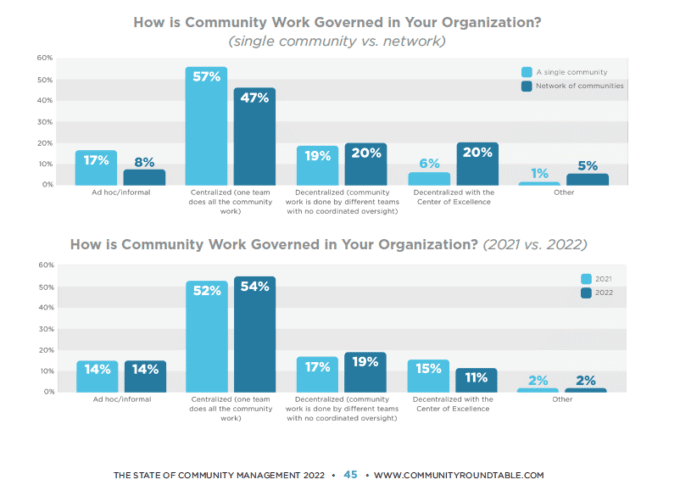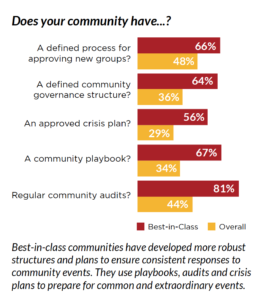The Policies & Governance competency of the Community Maturity Model™ details operational guidelines for successful online community programs. Policies refer to how a community interacts and can be divided into two areas: Terms of service – How a community is managed in legal terms and Guidelines – Articulate what behaviors are expected and why, plainly. Governance is how the community team is structured, operates within an organization, and supports community-related activities across the organization.
Most organizations could support multiple communities with myriad use cases. The most common include:
- General employee communities for knowledge sharing and collaboration
- Customer support communities for providing fast, inexpensive, always-on access to answers to product and service questions.
- Membership communities for groups like students, patients, alumni, or association audiences
In 2021, we saw the emergence of the “Center of Excellence’’ (CoE) approach, where community work is decentralized, but supported with a host of resources. While responses from this year’s data suggest CoEs are falling out of favor, digging deeper shows a different perspective.

Comparing the data from respondents who reported “one community” vs. “a network of communities” at their organization, we found a dramatic increase in CoEs once a network exists (i.e., once they’re past the initial use case). Also interesting, 17% of respondents (8% in networked communities) reported only ad hoc/informal governance. Question: Who’s in charge of the communities there? If this is you, please contact us. We want to feature you in a case study.
Interested in Growing Your Community? Become an Enabler!
On a related note, those with a network of communities are more likely to help communities programs scale by providing enabling resources to their organization than those with a single community. When comparing total data on community resources from 2021 to 2022 there isn’t much to report. Comparing responses from individual communities vs. a network of communities tells a different story (see pg. 45 of the 2022 SOCM or the image above).
It’s interesting to note: 30% of community managers representing a single community provide none of the resources mentioned in the survey, which likely results in a less strategic initiative. For those who want to grow beyond a single community, get out there and coach/evangelize.
Want to help community programs scale? Start a center of excellence?
Check out this short interview with Claudia Teixeira, Senior Knowledge and Learning Consultant at the World Bank Group.
Claudia and Anne Mbugua discuss what a center of excellence entails, the path to centers of excellence at the World Bank Group, and advice for implementing a center of excellence at your organization. Listen now.
Get more community ideas and advice in the 13th annual 2022 State of Community Management report:

 For years, community thought leaders in TheCR Network have
For years, community thought leaders in TheCR Network have 
